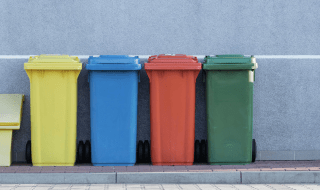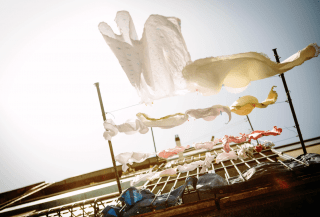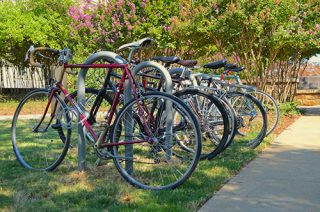And We’re Back.
The first week of classes has come and gone, leaving us students with the task of reestablishing routine. As you start integrating yourself into your new schedule (and begin the search for that elusive timetable that will allow you to study, eat, sleep, and have fun) don’t forget to follow these 10 steps to help reduce your personal carbon footprint and better our world.
10 Steps to Student Sustainability
 1. Buy Used Textbooks
1. Buy Used Textbooks
This one is a no-brainer. Not only are new textbooks really, really expensive, buying them is also a waste of paper and energy. Buying a used textbook (or renting one) is recycling. Reusing textbooks—whether by buying them used, renting them, or borrowing one from a friend—helps the planet by keeping the resources to make a new book (trees, water, energy) untouched. It also saves you a lot of money, as used books are invariably much cheaper than their new counterparts. Most bookstores have a used selection, and many of them will even buy back your book at the end of the semester so it can be used again!
2. Take Notes Electronically
One of the biggest categories of waste for college students is paper. An easy way to cut down on paper waste is to stop using paper altogether. We live in the technology age where taking notes electronically is not only possible, but easy. Most professors post their notes online, and converting those notes to an editable format takes only a few seconds. On top of that, there are tons of apps—such as Evernote, Simplenote, and Google Keep—that make electronically taking and keeping track of notes a breeze.
If you are one of those people who still prefers the feel of pen and paper to their virtual siblings, you can still cut down on your paper waste by recycling the paper when you are done, and bonus points for using recycled paper in the first place too.
Want to cut down on your paper waste even further? Check out this post on Tips for Reducing Paper Usage in College.
3. Reuse Mugs and Water Bottles
There are few sources of waste as absurd as plastic water bottles. While buying your water bottled is much more expensive than drinking water from the tap, there is no significant difference in the quality of the product. The idea that bottled water is safer or higher quality than tap water is a myth. In fact, in many cases, bottled water is actually just bottled tap water, sold at an enormous profit.
safer or higher quality than tap water is a myth. In fact, in many cases, bottled water is actually just bottled tap water, sold at an enormous profit.
To boycott the deceptive bottled water industry and save yourself some serious cash in the meantime, start bringing a reusable water bottle to class. Campus is covered in water fountains and bottle re-fill stations where you can top off on agua for absolutely free.
Secondly, did you know that “every year Americans drink more than 100 billion cups of coffee. Of these, 14.4 billion are served in disposable paper cups, enough to wrap the Earth 55 times if placed end to end.” You can help decrease this statistic by bringing your own reusable thermos. Not only will you be keeping hundreds of cups out of the landfill each year, but many places (including Starbucks) will give you a discount when you provide your own container.
 4. Recycle, Recycle, Recycle
4. Recycle, Recycle, Recycle
Recycling is an enormously important way to reduce waste, and on campus it is easy to do. Every building is equipped with recycling receptacles for paper, cans, and plastics. We at the University of Arkansas take recycling seriously and are always looking for ways to expand our on-campus recycling program. This year we were proud to begin accepting all plastics #1-7 for recycling in our “cans and bottles” bins. So whether its your backpack full of old notes, six empty cans of Red Bull, or plastic packaging, make sure to dump them in their corresponding bin and keep them out of the landfill.
5. Shorten Your Showers
While sometimes  there’s nothing more you want after a long day than to stand in the shower for twenty minutes, reducing your time under the spray is a great way to reduce your carbon footprint. Every minute spent with the shower on uses half a gallon of water, plus energy to heat and transport the water. Cutting down your showers by just one minute every day can save over 180 gallons of water annually.
there’s nothing more you want after a long day than to stand in the shower for twenty minutes, reducing your time under the spray is a great way to reduce your carbon footprint. Every minute spent with the shower on uses half a gallon of water, plus energy to heat and transport the water. Cutting down your showers by just one minute every day can save over 180 gallons of water annually.
For the more dedicated of you, try saving water by turning off the flow while you shave and brush your teeth. You can also cut down on the energy each shower uses by turning down the temperature – or even taking them cold. The really hardcore among you can save even more water by attempting the “Navy Shower“, where you turn on the water only long enough to get wet and then rinse off.
6. Wash On Cold
A whopping 75% or the energy used by your washing machine goes into heating the water. When you consider the  fact the almost all laundry detergents work just as well in cold water as hot, it be comes pretty obvious that washing your laundry on any setting besides cold is just an enormous waste of energy.
fact the almost all laundry detergents work just as well in cold water as hot, it be comes pretty obvious that washing your laundry on any setting besides cold is just an enormous waste of energy.
Additionally, washing on cold also helps your clothes last longer. Hot water can break down fabrics, cause shrinkage, and even fade dyes. Cold washes will keep your favorite sweater looking good, and it’s long life will keep you from having to consume more clothing—additionally decreasing your carbon footprint.
7. Clean Your Plate
Food waste is one of the most prolific and pointless areas of waste in the developed world. The statistics surrounding food waste are truly startling. It is estimated that 30-40% of all food produced in the US is never consumed. This is not only an enormous waste of resources (think of all that goes in to growing, harvesting, packaging, and shipping the food just for it to be thrown away), but it is also an enormous source of GHGs. Recent studies show that edible food is the second largest component of our landfills. Yes, that means that we as a country throw away more food than almost anything else—and this rotting food is also thought to be the largest source of GHG production in landfills.
The best and most effective way that you can make a difference in the fight against food waste is to reduce your own personal waste. This looks like joining our University’s Project Clean Plate—a pledge to “clean your plate” by eating everything you put on your plate when you visit the dining hall. Reducing food waste can also happen off campus—check out this article on how your fridge can become your best weapon against food waste.
8. Rethink Transportation
Another large contributor to student carbon footprints comes from the vehicles they drive. Cutting down on your personal emissions—and avoiding the misery of on-campus parking—is as simple as finding a new way to school. The simplest alternative to driving is walking, but the U of A is also equip ped with a free, reliable bus system that makes getting to campus easy. Click here to see the schedule and routes of the buses.
ped with a free, reliable bus system that makes getting to campus easy. Click here to see the schedule and routes of the buses.
Another way to commute is by bike. Biking will not only reduce your personal carbon footprint, seriously up your “cool-factor”, and save you money you would have spent on gas—it will also serve to keep you in shape. How’s that for a win-win-win-win situation? The city of Fayetteville and University of Arkansas both pride themselves on being bike friendly, boasting an extensive trail system as well as free bike repair stations throughout the campus and city. Click these links to see a map of all bike parking on campus and here to read more about bikes on campus.
9. Volunteer
One of the most impactful ways to live sustainably is to volunteer your time in support of local sustainable initiatives. We are fortunate to live in Fayetteville, Arkansas—a community full of businesses and organizations striving towards sustainability. There are even many sustainable initiatives on campus—such as our Full Circle Food Pantry and the GameDay Challenege. Getting involved is easy and worthwhile—not only will you meet great people around the community, you will also be doing your part to establish a sustainable lifestyle in our community and beyond. Click on this link to see a list of current volunteer opportunities in the community.
10. Vote
While making sustainable changes in your own life is great, the sustainability of the world—and your community—depends on societ y as a whole making sustainable choices as well. A major way to encourage sustainable behavior in your community (and country) is to vote for sustainable policies. We in the United States have been given a voice through our ability to vote. It is time for us to speak out in favor of policies that steward our resources in a way that benefits our planet and people, as well as our economy.
y as a whole making sustainable choices as well. A major way to encourage sustainable behavior in your community (and country) is to vote for sustainable policies. We in the United States have been given a voice through our ability to vote. It is time for us to speak out in favor of policies that steward our resources in a way that benefits our planet and people, as well as our economy.
Click here to read about the definition of “sustainability”
Click here to read more about why voting matters to sustainability.
